In this article:
Sunscreen is an essential product for protecting the skin against the harmful ultraviolet (UV) rays of the sun, which can cause skin damage and even skin cancer.
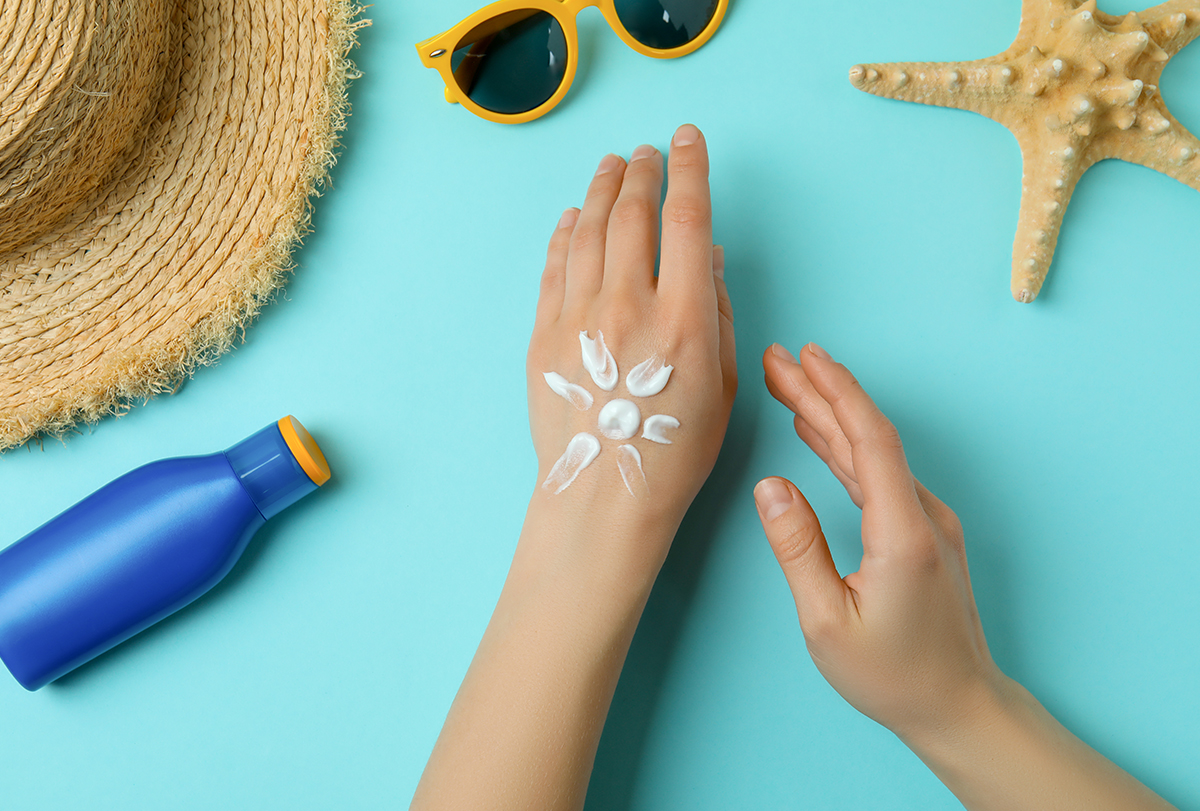
However, there has been some concern that sunscreen may dry out the skin, which can lead to a variety of issues including flaking, itching, and irritation.
According to dermatologists, while some sunscreens contribute to skin dryness, the drying effect is not an inherent characteristic of all sunscreens. Factors such as the type of sunscreen and individual skin type can influence the extent to which sunscreen contributes to skin dryness. (1)(2)
This article will explore whether sunscreen can indeed dry out the skin and what steps can be taken to prevent this from happening.
Why Can Sunscreen Cause Dry the Skin?
Sunscreens typically contain a combination of organic and inorganic compounds that work together to block or absorb UV rays.
Inorganic compounds, such as zinc oxide and titanium dioxide, stay on the outer surface of the skin and reflect or scatter UV rays away from the skin. Organic compounds, such as avobenzone and octinoxate, soak up the UV rays and turn them into heat energy, which is then scattered away from the skin.
While sunscreen is essential for protecting the skin against UV damage, certain ingredients in sunscreen could lead to skin dryness.
For example, some sunscreens contain alcohol, which can be drying to the skin. In addition, certain types of sunscreens, such as those that are designed to be water-resistant, may contain ingredients that can be harsh on the skin. (1)(3)
1. Sunscreens containing alcohol
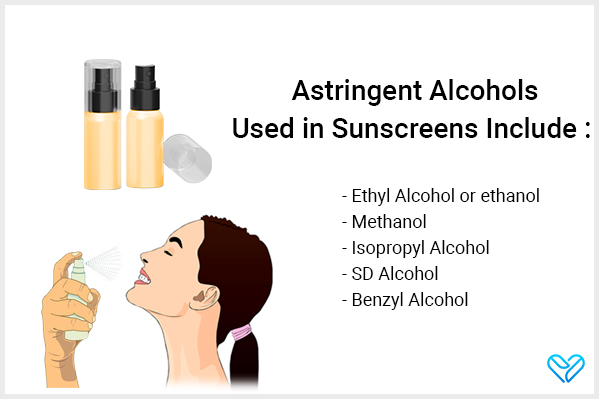
According to the National Rosacea Society, astringent alcohols often used in skin care products may have drying and irritating effects on the skin based on the quantity present in the product. (4)
If the astringent alcohol is shown in the top three or four of the ingredients list, it should be assumed to be present in a significant amount. Astringent alcohols include: (5)
- Ethyl alcohol or ethanol
- Methanol
- Isopropyl alcohol
- SD alcohol
- Benzyl alcohol
2. Sunscreens containing a mineral such as zinc oxide sunscreens
In a study, the use of a zinc oxide dressing on healthy skin caused a significant increase in skin dryness compared to the use of a hydrocolloid dressing.
The study also reported that the use of a zinc oxide dressing on healthy skin caused an increase in epidermal thickness, scaly appearance, and parakeratosis, which are characteristics commonly associated with dry skin conditions such as psoriasis and atopic dermatitis.
So, a high concentration of zinc oxide in sunscreen can cause skin dryness. (6)
Note: The benefits of sunscreen in protecting the skin against UV damage far outweigh the potential risk of skin dryness.
Choosing the Right Sunscreen
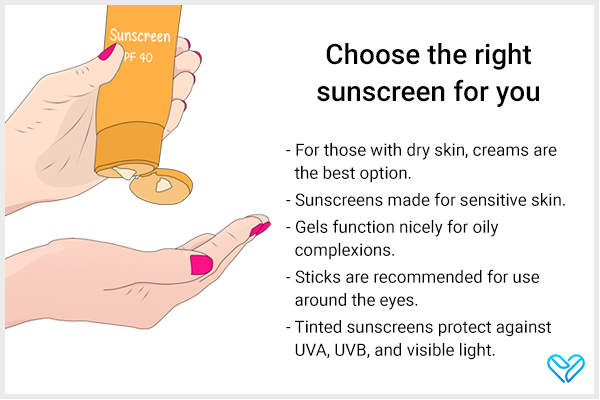
To prevent skin dryness from sunscreen use, choose a sunscreen that is formulated for your skin type.
The American Academy of Dermatologists recommends the following: (7)
- For dry skin, creams are the best option.
- A moisturizer can help to hydrate the skin and prevent dryness, particularly if the sunscreen you are using contains alcohol or other harsh ingredients.
- Sunscreens made for sensitive skin and babies are also available.
- Sunscreen gels function nicely for m and regions such as the scalp or chest with hair.
- Sunscreens sticks are recommended for use around the eyes, while sprays are easy to apply to children but may not provide adequate coverage if not used correctly.
- Tinted sunscreens protect against UVA, UVB, and visible light while reducing the white cast left by some sunscreens. (7)
- Apply a generous amount of sunscreen to all uncovered skin, and reapply frequently with a 2 hours gap or after swimming. If you are using a water-resistant sunscreen, be sure to reapply more frequently.
When Should You Apply Sunscreen?
It is recommended to apply sunscreen every day before going outdoors, regardless of the weather condition, as the sun emits harmful UV rays year-round.
Even when the sky is covered with clouds, around 80% of the UV rays can infiltrate the clouds and reach the skin. (7) Therefore, it is important to protect your skin from sun damage every day. (8)(7)
How to Apply Sunscreen
Here are some tips to follow when using sunscreen, as suggested by dermatologists: (7)
- Choose a broad-spectrum sunscreen with a minimum SPF of 30.
- Apply sunscreen 15 minutes before leaving home.
- As a general rule, apply 1 ounce (about a shot glass full) to cover the arms, legs, and torso of an average-sized adult.
- Also, put sunblock on your neck and your feet.
How Do You Know a Good Sunscreen?
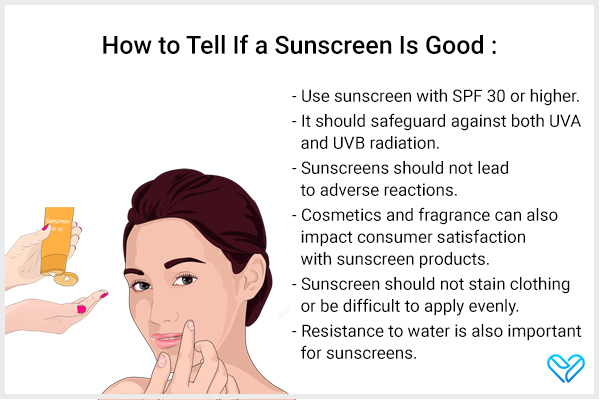
A well-formulated sunscreen should provide the required level of protection against UV radiation, while also being safe for topical use and pleasant to apply. (9)
Here are the properties of a good sunscreen:
- It should have an SPF of 30 or higher. (7)
- It should safeguard against both UVA and UVB radiation.
- It should not lead to adverse reactions, such as skin irritation or allergic responses.
- It should not stain clothing.
- For individuals engaging in outdoor activities or water sports, it should be water-resistant.
- It should be easy to spread evenly on the skin to ensure adequate coverage and protection.
- Cost is also a significant factor for some consumers. Sunscreens should be affordable and accessible to ensure widespread use and protection against UV radiation. (9)
Is a Higher SPF Better Than a Lower SPF?
According to dermatologists and research, it is advisable to use sunscreen with a minimum SPF of 30 as it can block around 97% of the sun’s UVB rays.
So, yes, a higher-SPF sunscreen can block slightly more UVB rays than a lower-SPF sunscreen, but neither sunscreen can deliver full defense against the UV rays.
So, it is important to remember that no matter what SPF you use, you still need to reapply every few minutes to protect your skin from UV damage. (10)
Sunscreen Use and Vitamin D
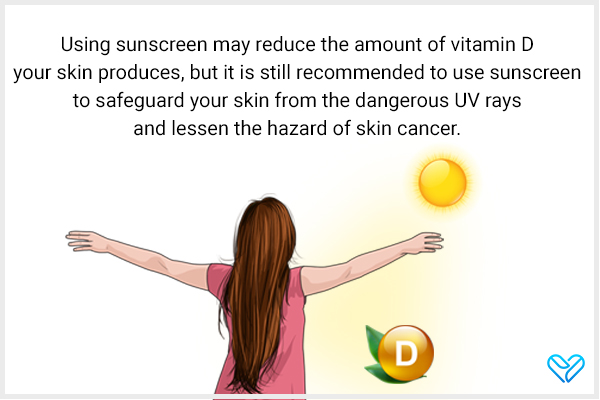
Using sunscreen may reduce the amount of vitamin D your skin produces, but it is still recommended to use sunscreen to safeguard your skin from the dangerous UV rays and lessen the hazard of skin cancer.
To obtain sufficient vitamin D, the American Academy of Dermatology suggests consuming a balanced diet that includes vitamin D-rich foods or taking vitamin D supplements if necessary. (7)
It is also recommended to consult a healthcare provider if you have concerns about your vitamin D levels. (11)
Most-Asked Questions About Using Sunscreen
What is sunburn?
Sunburn is a skin injury caused by increased exposure to UV rays. It can cause redness, pain, swelling, and, in extreme circumstances, blistering and skin peeling. (12)
When should I use sunscreen?
You ought to use sunscreen daily on skin not protected by clothes if you are not at home and are in the sun or outside. (9)
What kind of sunscreen should I buy?
Ensure that the sunscreen delivers broad-spectrum protection against all UV rays with an SPF of at least 30 and is also not washed away with water. (1)(9)
How often should I use sunscreen?
Reapply sunscreen around every 2 hours when you’re outside.
Can I use sunscreen on my kids?
Yes, it is okay to use sunscreen on kids. Make sure to choose a sunscreen that is specially formulated for children and reapply it frequently.
Final Word
While sunscreen can potentially lead to skin dryness, the benefits of using sunscreen to protect against UV damage far outweigh the potential risks.
By choosing the right sunscreen for your skin type, applying it correctly, and using a moisturizer alongside sunscreen if necessary, you can ensure that your skin stays healthy and protected against the harmful effects of the sun.
- Was this article helpful?
- YES, THANKS!NOT REALLY


